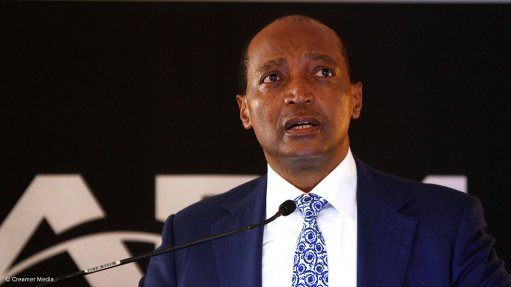
AREP chairperson Patrice Motsepe
Photo by: Creamer Media
Black business luminary Patrice Motsepe has labelled as “ridiculous” a recurring allegation that African Rainbow Energy & Power (AREP) is part of an unscrupulous plan to collapse Eskom and supplant the State-owned power utility with independent power producers (IPPs), in which the business would have a major interest.
Nevertheless, he acknowledged on Monday that AREP had a serious perception problem, which would persist for as long as his brothers-in-law, Cyril Ramaphosa and Jeff Radebe, occupied the positions of President and Energy Minister respectively.
AREP would not dispose of its renewables assets, or withdraw from recently awarded projects. Most of its future attention, however, would be directed to the development of a renewables portfolio in the rest of sub-Saharan Africa, which would be developed with support from a $100-million fund partly capitalised by African Rainbow Capital.
The company would also partner with private South African companies that intended pursuing own-generation projects to supply electricity to their mining or manufacturing operations.
Speaking during a media briefing in Sandton Motsepe said the appointment of Radebe, in particular, had been “very bad for business”, as it has created a “fundamental perception problem”. He likened it to his football team, Sundowns, playing in a CAF Champions League game where the referee and the assistant referees were relatives.
“We recognise that this is a legitimate concern.”
Allegations over conflict first came to the fore last year when Radebe approved the signing of 27 renewable-energy projects that had been delayed for three years as a result of Eskom’s refusal to sign power purchase agreements for the projects, procured during the fourth bid window of the Renewable Independent Power Producer Procurement Progamme (REIPPPP).
The “misrepresentations and lies” had intensified, however, after Ramaphosa announced in his 2019 State of the Nation Address that Eskom would be split into separate businesses of generation, transmission and distribution. While the President insisted that all three entities would remain State owned and under Eskom Holdings, opponents slammed the unbundling as a precursor to privatisation and retrenchments.
Motsepe said he had never supported the privatisation of Eskom and promised that AREP would not participate in any process involving the sale of the utility’s entities or assets, including the proposed sale of the Eskom Finance Company, which administers a home-loan book for the utility’s employees.
Meanwhile, CEO Brian Dames highlighted AREP’s relatively modest role in the renewables sector noting that, at R800-million, its total equity value represented less than 4% of the R20.6-billion achieved during the fourth bid window. It was also less than 10% of the black economic empowerment equity value of R8.6-billion injected during the round.
Dames also stressed that the company had not participated in bid windows two, three or 3.5 where the total equity value was recorded at R47.2-billion.
Instead the balance of AREP’s renewables portfolio had been secured through its participation in private bidding processes for solar photovoltaic (PV) and wind assets developed by SunEdison and Mainstream Renewable Power.
“It is patently clear that every single one of the nine REIPPPP projects that AREP is currently participating in, and has a minority shareholding in, were acquired from privately owned companies and not from the DoE,” Dames added.
Black Business Council president Sandile Zungu, who attended the briefing, said he was impressed by Motsepe’s transparency on the IPP issue, but slammed government’s earlier refusal to release the identities of the fourth REIPPPP bid-window participants, which had created a “cloud of suspicion”.